Spirituality

“TAKE OFF THE garment of your sorrow and affliction, O Jerusalem, and put on forever the beauty of the glory from God. Put on the robe of the righteousness that comes from God; put on your head the diadem of the glory of the Everlasting” (Baruch 5:1-2). We might occasionally hear in church a prayer that makes passing use of the phrase “the beauty of holiness,” but it can’t be claimed that we are helped very often to feel that the contagious goodness of God is absolutely lovely, alluring, and attractive. We are called to be beautiful human beings. Christians who are deeply serious about social justice, who carry the burden of the world’s brokenness in their hearts, who are committed to political dissent, probably need this reminder most of all. We can hardly be agents of change if our faces are disfigured by disgust and anger.
Advent may be an especially important time to listen carefully for the Word who summons us to be walking sacraments of God’s radiant beauty. Paul will speak to us about having joy in one another and clothing ourselves in love. We are meant to fill our imaginations in these weeks with the sight of Mary in the radiance of her final days of pregnancy. Doesn’t her beauty lend all the more power to her proclamation, “[God my savior] has brought down the powerful from their thrones, and lifted up the lowly; has filled the hungry with good things, and the rich sent away empty” (Luke 1:52-53)?

HILDEGARD BLEW in on a late summer storm. Sleek and ebony, eyes a bright chatoyant gold. Between the Supercans and downed tree limbs, she was scratching up worms, plucking at bugs. In this nation’s capital of a little more than 600,000 souls, a loose hen was highly unusual—but there she was, in all her Gallus gallus domesticus glory.
Of course, she didn’t arrive with the name Hildegard. And certainly not Hildegard von Chicken, after a favorite Rhineland mystic. That came later. After she’d been interviewed and photographed for the DCist news blog; after she’d become a destination point for recently migrated hipsters; and after a woman running for local office asked if she could take Hildegard on the campaign stump to make her candidacy “more memorable.”
Hildegard received her name after a chance encounter with La Señora at the 11th street bus stop. “I rescued a chicken,” I told her. “What color?” she shot back.
La Señora is in her 70s and from Paraguay. She is knowledgeable about many things. “Black ... with a green undersheen,” I said. “This is very good. You have most likely rescued it from a religious ritual where it would be sacrificed for evil intentions.” “Wow!” I replied. “What should I do?” La Señora stared at me a moment: “You must pray the rosary with the chicken. Hold her and pray the rosary.”
THIS WAS THE series of curious events that led to my being perched on porch steps on a hill in the imperial city of Washington, D.C., holding my grandmother’s rosary and praying with a chicken, whose name I decided should be Hildegard, “Sybil of 11th Street,” because she was consulted by so many of high and low estate.
IN SPRING 1986, a group of Italian activists led by Carlo Petrini launched a protest against the opening of a McDonald’s near the famous Spanish Steps in Rome. This protest marked the origin of the Slow Food movement, which has spread over the last 26 years to more than 150 countries.
Following this Slow Food effort came a host of other Slow movements—Slow Cities, Slow Parenting, Slow Money, and more—that collectively raise opposition to the speed and industrialization of Western culture. Slow movements are beginning to recover what we have lost in our relentless pursuit of efficiency. Many Christians have been challenged by these Slow movements to consider the ways in which our faith has begun to move too fast as we make sacrifices to the gods of efficiency.
This quest has sparked a renewed interest in the joys of sharing life together in local congregations and has intensified into a growing conversation—rather than a movement—called Slow Church. Slowness itself is not a cardinal virtue of Slow Church, but rather a means of resisting the present-day powers of speed in order to be faithful church communities.
The biblical vision of God’s mission in the world is God’s reconciliation of all creation (see, for example, Colossians 1:15-23 and Isaiah 65:17-25). But too often we narrow the scope of our faith and ignore the massive damage that incurs. Some Christians reduce the faith to four easy steps to stay out of hell, others to a set of techniques for growing a large church, and still others to a political ideology (of the Right or the Left). Christianity has also been reduced by some to a feel-good spirituality that has little or no bearing on the rest of our lives or in the public square.
AS MY EXTENDED family gathered around the Thanksgiving dinner table before the latest market crash, conversation with cousins flowed about friends making big money with technology start-ups: “more, more; faster, faster; bigger, bigger; louder, louder.”
A hail of laughter greeted me when I quietly muttered that my ambition was, “poorer, poorer; slower, slower; smaller, smaller; quieter, quieter.”
When Sojourners started in 1971, I was 23 years old. Seven young seminary students pooled $100 each and used an old typesetter that we rented for $25 a night above a noisy bar to print 20,000 copies of the first Post-American, the predecessor to Sojourners magazine. We took the bundles in our trucks and cars to student unions in college campuses across the country and began collecting subscriptions in a shoebox kept in one of our rooms.
For more than a decade, we shared our money in common, trying to live as the early Christians (see Acts 2), and allowed ourselves $5 a month for personal spending. The highest-paid staff person was a young woman from a neighborhood family who wanted an evening cleaning job.
We worshiped together twice a week and opened our homes to our neighbors. When our first child was born, Jackie and I brought him home to a row house in Columbia Heights in D.C. where we were living with 18 other people, including an African-American family and a Lakota couple with some of their extended family from the reservation in South Dakota. You had to be a bit crazy to be in the early community. And yes, we were poor. And we were small.
WHY IS the message of a poor Galilean preacher “good news for the poor”? Does he show the poor a way of escape from their misery by providing a vision of spiritual wealth? Is the message he brings suited especially for those who live in poverty and for them alone?
We cannot stop proclaiming Jesus’ words today, just because for some people they sound like “pie in the sky.”
How blest are you who are in need, the kingdom of God is yours. How blest are you who now go hungry, your hunger shall be satisfied. How blest are you who weep now, you shall laugh (Luke 6:20-21).
Editor's Note: Sojourners has launched this new blog series to help shed light on the nation's latest "religious" affiliation. Go HERE to read their stories. Or EMAIL US to share your own.
PBS Religion & Ethics Newsweekly has wrapped up its three-part new mini-series on the rise of the unaffiliated. Go HERE to read more about this week's episode.
Watch None of the Above: Religious Implications on PBS. See more from Religion & Ethics NewsWeekly.
In the aftermath of Superstorm Sandy, thoughts on natural disasters, the divine, and 'why bad things happen to good people.'
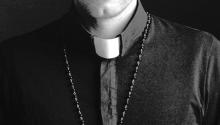
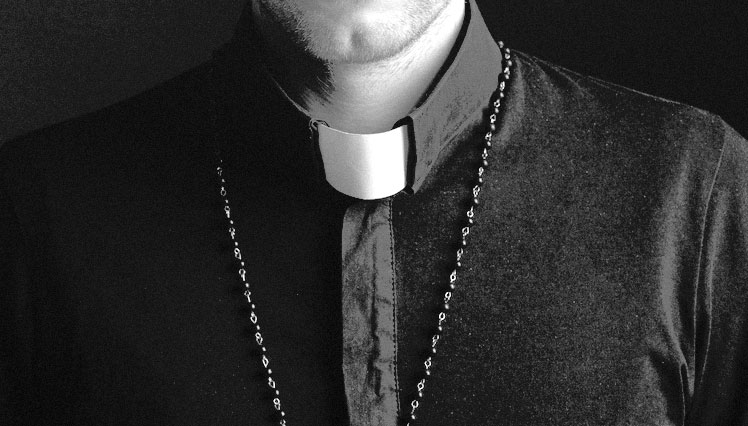 Editor's Note: Kevin Gonzaga tells his story of why he's part of the 20 percent of Americans who identify with "no religion in particular." Find more stories (or share your own) HERE. Read about the study HERE.
Editor's Note: Kevin Gonzaga tells his story of why he's part of the 20 percent of Americans who identify with "no religion in particular." Find more stories (or share your own) HERE. Read about the study HERE.
Three years ago when I arrived at seminary to pursue my calling to fulltime pastoral ministry, one would probably have struggled to find someone in my generation more committed to the ministry and vitality of the local church.
While imperfect, I believed the church was the best hope of the world, and it was better to stay and work toward change than abandon the church and look for greener pastures. A year and a half later, I wrote a blog post explaining that I was no longer a Christian. I fear that this would only deepen the stereotype that seminary is a place where people lose their faith, so I should explain.
The truth is I am one of growing number of people who choose not to affiliate with any organized religion. I am a “none,” and my journey to “none” started a long before I left for seminary. My disillusionment with, and eventual abandonment of, Christianity did not center around one traumatic event that shattered my faith, but rather it was something that coalesced from numerous experiences over a long time.
It really started when I began studying the scriptures for myself in college. I was shocked to find many things I had been taught by the Church were wrong, were not in the Bible, or were even contrary to what the scriptures actually taught.
Art and iconography — both ancient and modern — from Ethiopian Orthodoxy (also known as Tawahedo or "being made one" in the Ge'ez language that remains the official language of the Orthodox liturgy here) were ever-present — in shops, restaurants, and hotel lobbies as well as in the myriad churches and monasteries, and the sounds of ancient Christian prayers and the chants of monks filled the air from the capital city of Addis Ababa to the kebeles (or neighborhoods) on the outskirts of Bahir Dar, another major city about 60 km from the Sudanese border.


Editor's Note: Megan Monaghan Rivas tells her story of why she's part of the 20 percent of Americans who identify with "no religion in particular." Find more stories (or share your own) HERE. Read about the study HERE.
There are never really two kinds of people in the world. But for purposes of this post, I’ll posit that there are two kinds of “nones” in the world – “nones” who would be part of a church if they could just find the right one, and “nones” who have no desire to be part of a church even if it matched them perfectly. I place myself in the latter category.
Like many “nones,” I started out as a “some.” I was reared in the Roman Catholic Church and educated in Catholic schools. As luck and the development curve would have it, just after confirmation (at age 14) I started finding out things about the church that I could not stand up and be counted for. The church’s policies concerning women and homosexuals seemed to me to stand in deliberate polar opposition to the Gospel message. And the church is not known for willingness to change from the inside. I didn’t have another 2,000 years to wait. My first “adult” move in the church was to leave it.

In a world that seems completely and irrevocably divorced from the teachings of Christ, where in contemporary society is there a place for the Christian voice? Politicians shamelessly use Jesus’s name to justify their authority and gain influence without bothering to unpack the full depth of theological and ethical implications of their words. Corporations are granted the rights of individuals, but some individuals are denied the resources they need in times of crisis to support their families and livelihoods. And the public debate is so full of vitriol and hyperbole that dehumanization and outright hatred of those with whom we disagree has become the norm. In light of the situation in which we find ourselves, how then should Christians behave?
While it might seem appealing to remove ourselves from secular society altogether and forsake the world in all its brokenness in favor of a uniquely Christian ethic that appeals and applies only to us, Christians have an obligation to serve as active participants in public discourse— elevating the conversation rather than abstaining from it so that we may try to live the truth and convictions of our faith.
PBS Religion & Ethics Newsweekly has launched a new mini-series on the rise of the unaffiliated. Go HERE to learn more.
Watch None of the Above: Who Are They? on PBS. See more from Religion & Ethics NewsWeekly.

[The "nones"] recite history and Christian leadership's collusion with the agents of empire-building and warfare. Then they say something like, “I'd rather live like Jesus than be a Christian.”
They see the Church as the rich young man and they wonder if anyone actually follows Jesus anymore.
Of course, this is not the only demographic shift at work in the religious life of the world.
There are more Anglicans in Nigeria than there are in England.
More Presbyterians in Ghana than in Scotland. ..
More Baptists in Southeast Asia than in the Southeastern United States.
More Christians go to church in China than in Europe.
In 1900, 71 percent of the world's Christians were in Western Europe. By 2000 that percentage dropped below twenty percent in some European nations.
Here's the real kicker: these are not problems to fix. They are simply realities to be faced.
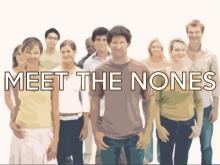
Editor's Note: Sojourners has launched this new blog series to help shed light on the nation's latest "religious" affiliation. Scroll down to read their stories. Or EMAIL US to share your own.
Which religious tradition do you most closely identify with?
- Protestant
- Catholic
- Mormon
- Muslim
- Jewish
- Orthodox
- Other Faith
- Unaffiliated
Given these options — or even if you throw in a few more like Buddhist, Hindu, Agnostic — I would choose “Unaffiliated.” That puts me into a category with one-in-five other Americans, and one-in-three millennials, aptly named the “nones.”
In that vein, I introduce our new blog series: Meet the Nones. Through this series, I hope to encourage discussion, debate, and elucidate the full picture of what it means to be losing your religion in America.
Editor's Note: Would you like to share your story on this topic? Email us HERE.
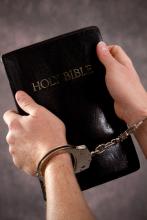
TORONTO — The Canadian government is canceling the contracts of all non-Christian chaplains at federal prisons.
By next spring, Muslim, Jewish, Sikh and other non-Christian inmates will be expected to turn to Christian prison chaplains for religious counsel and guidance.
In an email to reporters on Oct. 4, the office of Public Safety Minister Vic Toews, who is responsible for Canada's federal penitentiaries, said the government "strongly supports the freedom of religion for all Canadians, including prisoners."

IT WOULD BE strange if any segment of the liturgical year left out the theme of migration. The Bible is riddled from end to end with the journeys of nomads, pilgrims, exiles, returning exiles, and the risky intrusions of strangers across boundaries erected to deter them.
This season’s poster child for divinely inspired mobility is the lovely figure of the Moabite “alien” Ruth, who chooses to leave her own country and accompany her beloved Jewish mother-in-law when she returns as a widow to her native Judea. Ruth’s story is romantic, even erotic, as she daringly slips into the arms of Boaz during the sexually charged siesta at the threshing floor. But our readings are no mere novelette. Scripture shows how much hinged on her pluck and her allure. Her great-grandson will be David, and her descendant Jesus the Messiah!
“Where would we be without immigrants?” is one of the many questions between the lines of the scriptures. The Bible has lots to say to us about the divine impulse active in migrations, and the opening of the heart to “strangers within our gates”—things guaranteed to alarm defensive nationalists of every stripe.
I remember the deep spiritual emotion that caught us all up in Boston’s Faneuil Hall during my naturalization ceremony—Cambodian refugees, Vietnamese grandmothers, Salvadoran families, and all the rest of us. I think of the migration of my own great-grandparents to Russia, and the adventures that have scattered my own family from New Zealand to Mexico. How God revels in mixing us all up!

A couple days ago I called my friend Kae so we could talk about this Gospel reading where Jesus takes a child in his arms and teaches the disciples that if they welcome a child in his name they welcome God. And we started talking about the actual reality of children and how difficult small ones can be to manage. Kae told me of this brilliant technique she employs when dealing with toddlers.
She said it really helps her to be patient and compassionate with defiant, emotional, snot-faced toddlers when she just thinks of them like little versions of really drunk friends. Then when they keep falling down and bumping into things and bursting into tears she just treats them like she would a friend who is too drunk to know what they are doing, and who you just try and make sure doesn’t hurt themselves, and who you clean up bodily fluids from, and make sure they drink some water, and then just lovingly change them into their pajamas and tuck them into bed.
Children are really a mess.
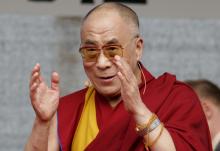
My friend, Doug, is not what I’d call a religious person. He grew up in church but has since taken to a combination of practicing martial arts, yoga, and independent study, primarily of Buddhist philosophy. In a lot of ways, his journey is a familiar one for younger adults today (he and I are both 40 so we don’t really qualify as “young” adults anymore).
Doug is, like I am, an intellectually curious guy. He follows my work pretty closely, and he is certainly open to other points of view, even if they’re not ones he embraces for his own life. Sometime we share ideas back and forth, but this quote from the Dalai Lama that he sent me recently really got my attention:
"All the world’s major religions, with their emphasis on love, compassion, patience, tolerance, and forgiveness can and do promote inner values. But the reality of the world today is that grounding ethics in religion is no longer adequate. This is why I am increasingly convinced that the time has come to find a way of thinking about spirituality and ethics beyond religion altogether."
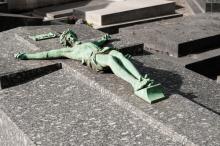
Why did Jesus have to die? Was it to appease a wrathful God's demand for punishment? Does that mean Jesus died to save us from God? How could someone ever truly love or trust a God like that? How can that ever be called "Good News?"
It's questions like these that make so many people want to have nothing to do with Christianity.
Countless people filling our pews have adopted this hurtful view of God and themselves. It has led many to internalize feelings of shame and self-loathing, thinking this is what God desires. Others have lost their faith entirely because of it, unable to worship a God who seems to them to be a moral monster. Faith motivated by fear, threat, and feelings of worthlessness. How could things have gone so wrong?
When did the good news become bad news?
Hello fellow Sojourners!
This is a brief missive for your enjoyment. I just returned from the Wild Goose Festival in Corvallis, Ore.
Yes, Oregon and not North Carolina. You see, in a fit of wisdom, the good people of Wild Goose found a west coast location. I hope it worked well for them because I'm sold on the place.
I wish you could have been there. It was amazing. To tantalize you into attending next year, here (in no particular order) are Nine Good Reasons to Attend The Wild Goose Festival.
1. There are no bugs.
None. Well, some flies, but this is Oregon and not North Carolina and though the nights are chilly and the mornings moreso (I awoke the last morning to see my breath in the air), the sun arose and everything warmed up to make for some of the most beautiful weather you'll ever experience.
2. All the notables are there.
Rachel, Richard (and Richard), Brian, Nadia, Gareth, Bruce, Christian, Amy, Yvette, Hilary, Greg, Steve...So many people to meet and to know.